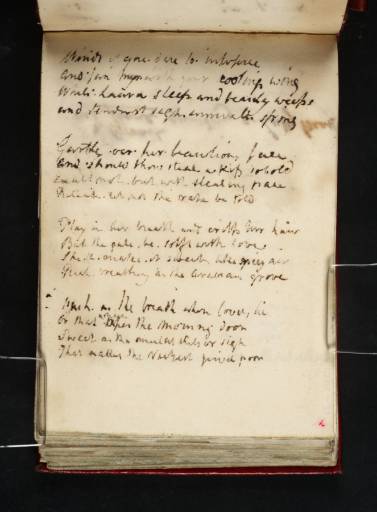Turner’s inscription reads:
Winds if you dare to interpose
And fan her with your cooling wing
While Laura sleep and beauty weeps
And tenderest sigh unrivall Spring
Gently oer her beauteous face
And should thou steal a kiss so bold
Exalt not but with stealing pace
Return let not the rape be told
Play in her breath and crisp her hair
But the gale be soft with love
She’ll make it sweet like spring air
Rich breathing as the Arabian grove
Hush as the breath when lovers lie
Or that [which inserted] opes the Morning door
Sweet as the muted winds or sigh
That makes the richest jewel poor
These stanzas are written as if they are an original continuation of those on folio 64 verso (
D07953), to be read under the title given on the recto of this leaf (
D07954), ‘On a Jewel [Brooch
inserted] guarding a Ladies breast’. They were published by Lindsay as Turner’s own work. However, as Wilton was the first to recognise, the present passage is a reworking of Charles Cotton’s poem
Laura Sleeping.
1 Wilton notes that ‘it is not known where Turner encountered the poem’
2 but one possible source is an anthology of love poetry recently published in 1807.
3 More generally, Turner may have been led to Cotton by his reputation as an expert fisherman and authoritative contributor to Izaak Walton’s
The Compleat Angler (5th ed.1676).
Wilton cites this adaptation and incorporation of Cotton’s romantic verse as an example of a ‘curious phenomenon’ found in Turner’s writing: his setting out a poem by another writer ‘as if it were his own, with rephrasings and alterations of lines which seem to follow the usual patterns of spontaneous composition’. Here, Turner ‘seems to be pressing stanzas from elsewhere into service to lengthen his own poem’.
4 Rather than literary plagiarism, the analogy must be the artist’s imitations and adaptations of Old Masters and contemporary colleagues in his paintings. His version differs considerably from Cotton’s own:
Winds, whisper gently while she sleep
And fan her with your cooling wings.
Whilst she drops of beauty weeps
From pure and yet unrivall’d springs!
Glide oer beauty’s field, her face.
To kiss her lips and cheek be bold.
But with a calm and stealing pace,
Neither too rude, nor yet too cold.
Play’d in her beams, and crisp her hair,
And such a gale as wings soft love;
And with so sweet, so rich an air,
As breathes from the Arabian grove.
A breath as hush’d as lover’s sigh,
Or that unfolds the morning’s door;
Sweet as the winds that gently fly
To sweep the spring’s enamell’d floor.
David Blayney Brown
August 2009

